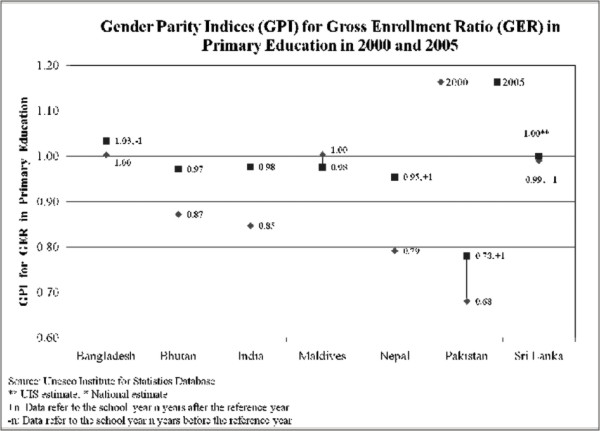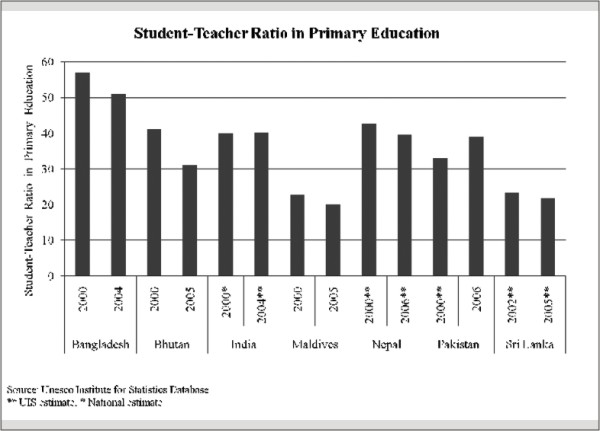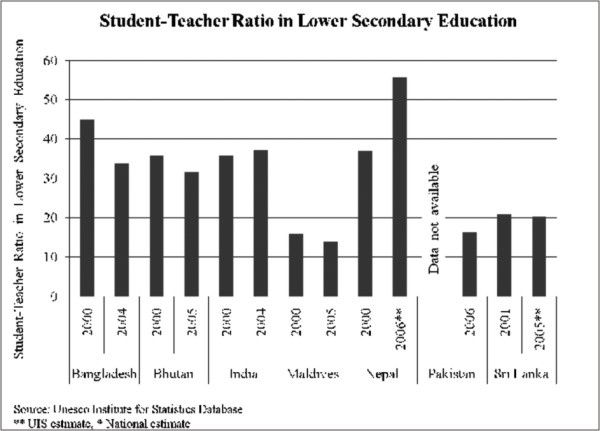
South Asia Civil Society Charter on EFA
Preamble
We the representatives of civil society and education coalitions of South Asia - Afghanistan, Bangladesh, India, Nepal, Pakistan and Sri Lanka - have come together in Dhaka, Bangladesh from December 11-12, 2009 to uphold and strengthen our commitment to ensure Education For All in our countries.
 Rasheda K Choudhury, Executive Director, CAMPE (2nd from left) speaking at the South Asia Civil Society Consultation. |
While there has been some success on the road to EFA goals, there still remain huge gaps due to the immensity of the challenges. We urge that the Ministerial Meeting of the South Asia EFA Forum will seriously consider the following demands for inclusion in the Dhaka Declaration, that have come up from the multi-stakeholder constituencies represented by the participating organizations.
1. Full Inclusion and Access to Free, Quality Basic Education
-Quality education must ensure the acquisition of age-specific and developmentally appropriate skills, abilities and knowledge.
-Governments should focus on reducing drop-out rates, especially of female students and ensure completion of the full learning cycle.
-All South Asian countries shall commit to take new and bold steps to ensure that all people and groups currently unreached have access to quality basic education. Those not adequately reached include women and girls, indigenous groups, nomads, minority groups, people with disabilities, low caste groups, street children, rural and urban poor, those living in remote areas and in conflict and disaster prone areas, and others who are excluded due to various socio-political and economic reasons. All these groups and peoples have a right to basic education that is responsive to their unique and special needs. The respective Governments need to ensure that education is made available to them and is easily accessible.
-Literacy and basic education for youth and adults need to be provided and set within a life-long learning framework that provides opportunities and pathways from basic literacy to ongoing learning.
2. Right to Education Focusing on Policies and Financing
-All South Asian countries shall commit to guarantee through legislation that no citizen is excluded from quality basic education. An example is the Right to Education Act in India. The responsibility for education lies with the government, specifically the ministry of education. Attempts to shift this responsibility through privatisation of basic education should be discouraged.
-There needs to be policy coherence between various government ministries (for example, education policy should address disaster issues and disaster risk reduction policies should include education plans).
-Clear, measurable, time-bound and integrated implementation plans need to be developed for every education related policy.
-All South Asian countries shall by end 2010 calculate the full cost of achieving quality Education For All by 2015. This should include adequate allocations for professional teachers, integration of teacher training with teaching practice in appropriate learning environments, infrastructure, teaching-learning processes, the learning and reading materials, and all other quality learning inputs.
-Education should be made the top budgetary priority. Governments should commit to make all possible efforts to systematically increase education spending to reach a minimum of 6% of GDP or allocate at least 20% of national budget for education, as committed in the Dakar Declaration and other global forums. Given that adult illiteracy in this sub-region is the highest in the world, South Asian governments should also commit to allocate at least 6% of the education budget to adult education, including TVET by 2010, half of which should be earmarked for literacy initiatives.
-Crises (food, energy, finance, conflict or disaster) should not be used as an excuse to reduce allocations to education. Countries should sustain and increase commitment to education, acknowledging that investment in education is the best bail-out package for its citizens and to achieve EFA. Emerging areas of education (post EFA and MDG) such as disaster/climate change need to be reviewed and strategized accordingly.
-The best 'defence' countries could have is investment in the education of their citizens, rather than in defence.
-Bilateral and multilateral funding agencies and mechanisms (e.g. the Fast Track Initiative) in keeping with the Paris Declaration shall be negotiated by the education and finance ministries to ensure that no South Asian country fails to achieve the EFA targets for lack of resources.

Civil Society delegates from South Asia at the consultation.
3. Civil Society Participation in Decentralisation Processes
-To effectively translate policy into action, a strong multi-stakeholder approach is crucial. National level multi-stakeholder structures need to be convened for example, all relevant ministries, local government, donors, CSOs including teachers, learners, unions, universities and media to mobilize support for sustaining public education and learning. Civil society should be accorded legitimate space for participation in the policy processes to promote education in a truly collaborative manner.
-All governments should commit to the effective engagement of local governance bodies, including parents and the local community in ensuring quality basic education. National task forces for EFA should be revitalized and made more inclusive, comprising all stakeholders.
4. Collaboration and Learning Based on South- South Partnership
-While most initiatives focus on North-South relationships based on technical assistance and financial aid, the untapped potential of South- South partnerships and linkage is not being accorded due attention. South Asian governments should commit to strengthen the cooperative and learning partnership among the countries in the sub-region. It is essential for moving towards Education for All based on solidarity and shared learning.
5. Sectoral Plan beyond Project Approach
-Countries need to consider and commit to education sectoral investment plan going beyond discrete projects and sub-sectoral plans.
-Fully financed and time bound national plans must address the full EFA agenda, going beyond the focus on universal primary completion promoted by MDGs and ensuring priority to neglected goals such as ECCE, adult literacy, second chance education.
6. Multi-stakeholder Monitoring Mechanism
-Comprehensive multi-agency monitoring mechanisms need to be in place to ensure appropriate delivery of the commitments.
-South Asia Education Ministerial Meetings should be more frequent and should report on progress on commitments from one meeting to another, based on clear benchmarks developed and agreed to, nationally and regionally.
-The Forum should establish a South Asia Taskforce for Education, composed of a balanced number of government and civil society representatives
Accelerating Toward Goals and Targets
As the year for achieving the EFA goals looms nearer (2015), governments of the region cannot afford to take a 'business as usual' approach. Now is the time for renewed political will for decisive action. We call on the governments of the region to make firm commitments, backed by effective plans and strategies and the resources required to implement them effectively. In this way the pledge of achieving Education For All can be fulfilled.
From Rhetoric to Coherent Action
1. There needs to be a recognition of the enormous scale of the violation of the fundamental human and social right to education of adults and young people. As such CONFINTEA V1should declare a state of crisis, requiring urgent action. Basic adult education is already a justiciable human right and we urge all governments to pass legislation to make all adult education a legally enforceable right.
2. The education of adults and young people is key to helping people, especially women, (who are worst affected) to cope with all types of crises (food, fuel, finance, conflict or climate), enabling them to shape a sustainable future and to work towards gender equality and justice. Popular education is key to the renewal of adult learning as a means to social and political transformation.
3. A legal structure for the governance of the education of adults and young people should be present in all countries, specifying the involvement in decision-making of civil society, learner representatives and educators alongside government. The education of adults and young people should be inclusive and diverse, spanning all areas of human activity and fostering well-being rather than just economic development. As such it should be based on inter-sectoral and inter-ministerial action but with strong leadership from (and ultimate responsibility lying with) Ministries of Education.
4. There should be no more collection of simplistic data or statistics based on the artificial division between illiteracy and literacy. All surveys, research and data collection or reporting should focus on a continuum of literacy levels appropriate to people's life, work, cultural and linguistic contexts. All data should be disaggregated by gender and other bases of potential discrimination (e.g. race, ethnicity, class, caste, sexual orientation, gender identity, generation, disability, geographical location, citizenship status, imprisonment etc).
5. Adult learning should be recognised as the glue behind achieving all the MDGs and should therefore be prioritised in national plans and in the review of progress towards the MDGs. All governments should develop fully-costed policies, well-targeted plans and legislation for addressing adult literacy and lifelong learning by 2012. These plans should be based on credible evidence (e.g. new national surveys) on literacy levels and present participation rates in adult learning and they should be seen as an integral part of any education sector or poverty reduction plan. These plans should recognize the role of education in transforming values and attitudes and in challenging all kinds of discriminatory practices, for example those based on gender. The plans must also address the new challenges of digital literacy, the urgent need for improving the capacity for research and evaluation as well as the need for quality training and better remuneration of adult educators.
6. Governments should calculate the full cost of achieving quality education for adults and young people, and should agree to binding minimum targets for spending on adult education including at least 6% of national education budgets being spent on youth and adult education (in countries with significant literacy challenges where a minimum of half of this should be spent on literacy). An equally binding target should be agreed of at least 6% of aid to education being spent on the education of adults and young people (premised on at least 0.7% of GNI being spent on aid and 15% of overall aid being earmarked for education). The international community and financing agencies should recognise Goals 3 and 4 from Dakar as equally important as other goals in all their education aid and should develop accurate projections on financing gaps for achieving these. At least $10 billion in new aid is needed by 2015 to make an impact on adult literacy.
7. The Fast Track Initiative needs to be radically transformed into a Global Initiative on Education For All which explicitly requires sector plans to include credible action on, and investment in, youth and adult, especially women's, literacy. This transformed initiative should be fully independent from the World Bank and much more ambitious than the present FTI in the scale of resources that it mobilises.
8. The G20, which recently re-empowered the IMF, needs to challenge the restrictive macro-economic conditions imposed (and policies promoted) by the IMF that have undermined investment in education for all. There should be a clear requirement on the IMF to show sustained flexibility in inflation and deficit targets through to 2015 that will allow for significant increases in long term investment in education as a key part of the solution to the financial crisis.
9. All governments have a responsibility to maximise the learning opportunities available for all people on their territory and so should ensure that sustainable investment is maximised from individuals, employers and the State to ensure no-one is left behind. All employers should invest at least 1% of the payroll in work-related education and training. All resources should be well targeted to ensure they reach those who are most disadvantaged or excluded, especially women who often suffer from multiple marginalisation. It is important to recognise that no country has fully overcome the challenge of including all people and of transforming the profile of participation in adult learning. In all contexts adult learners themselves should have a voice in the development of policies and practices that affect them.
10. There need to be comprehensive and multi-agency monitoring mechanisms for ensuring that these commitments are delivered. At a national level this should include public institutions, universities and civil society. At an international level this should include for example OECD DAC requiring reporting on aid to adult education, UIS and GMR tracking government spending, WHO monitoring 5% recommendation on health promotion, FAO tracking agricultural extension and so on. There need to be clear benchmarks established by 2012 in all areas so as to facilitate assessment of progress. There should be a global monitoring report with rigorous data on adult learning every three years, which will inform analysis of progress towards CONFINTEA commitments and feed into other UN processes (e.g. on climate change, financing for development, women's rights, MDGs, population, migration, etc).
Civil society has a crucial role to play in rigorous monitoring and in being a critical partner of government in developing adult learning policy and practice.
Confintea Civil Society Caucus
Education Scenario in South Asia





